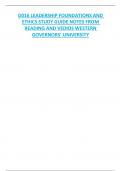D016 LEADERSHIP FOUNDATIONS AND
ETHICS STUDY GUIDE NOTES FROM
READING AND VEDIOS WESTERN
GOVERNORS’ UNIVERSITY
, lOMoAR cPSD| 19857451
1
Leadership Foundations and Ethics
D016
Study Guide for the Objective Assessment
Unit 1 – Introduction – N/A
Unit 2 – Building Inclusive Culture and Community
Module 1: Mission, Vision, and Core Values
1. Definition, compare/contrast, and role within school
- Mission Statement – attempt to articulate the purpose of why schools exist and are
foundational to future success of societies. a sentence or short paragraph written to
reflect the school’s core purpose, identity, values, and principal aims.
- Vision Statement - must fit the given situation of your building. Defined as a
sentence or short paragraph a broad, aspirational image of the future.
- Core Values – beliefs and learning expectations should shape the culture and
determine the priorities of the school/center, and serve as the guiding force behind
decision-making related to curriculum, instruction, assessment, policies, and
procedures.
2. Evidence and Impact of Mission, Vision, and Core Values
3. Internal Stakeholders of Mission, Vision, and Core Values: Leadership, Teachers, Staff,
Students
4. External Stakeholders of Mission, Vision, and Core Values: Parents, Board, Businesses,
community members.
Module 2: Building Community
, lOMoAR cPSD| 19857451
2
1. Conversational Leadership – Define, Six Processes and examples
2. Define and discuss role of each in building community
- Trust, generates buy in from teachers staff and community
- Transparency, Generates trust, when stakeholders know why you are doing things
they can trust your motivations
- Inclusion, by incorporating all students in to the classroom all students benefit.
3. Four components of cultivating a positive professional culture
a. Promoting Trust
b. Establishing a growth-oriented professional culture
c. demonstrating a commitment to diversity, equity and inclusion
d. Cultivating emotional intelligence
4. Define and consider within education:
- Open systems: a system influenced by external forces, Schools are influenced by TEA,
Board decisions, Parents, Community leaders and politics.
- Closed systems: a system free from external forces, Impossible from a school stand
point as we have external stakeholders that influence
- Social systems the school is characterized by an interdependence of parts, a clearly
defined population, differentiation from its environment and a complex network of
social relationships
5. Feedback loops – definition and example in practice
- Internal feedback loops, INternal feedback loops are when the output influences the
product. Ex. the school bureaucracy approves of an individual’s performance,




